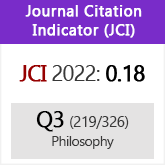Las trayectorias del concepto de vida en el pensamiento de Judith Butler
DOI:
https://doi.org/10.3989/isegoria.2017.056.08Palabras clave:
vida, vivibilidad de la vida, ontología corporal, vida digna de duelo, vida desechada, vida precariaResumen
En este ensayo, nos proponemos explorar los diferentes significados de los conceptos de vivibilidad y vida en el pensamiento de Judith butler. si bien es crucial para su obra temprana —butler se refiere por primera vez a este concepto en su introducción del libro, El género en disputa de 1999—, el concepto en sí emerge con más claridad y elaboración en su obra tardía (Deshacer el género, Vida precaria y Apuntes hacia una teoría performativa de asamblea). nuestra pregunta principal sería: ¿cuál es el hilo conductor que une las diferentes concepciones de vida en el trabajo de butler? ¿cuáles son los lazos entre la vida abyecta, invivible, precaria, indolora, desechada y desposeída? De estas dos preguntas surgen otras más: como la cuestión de gradación de vivibilidad — qué vida importa, y “cuánto,” y cómo pensar este tipo de cuantificación de algo no-cuantificable—; y la cuestión de la universalidad (todas las vidas importan). estas preguntas, obviamente, tienen que contar con evidencias bajo las cuales la vida es cualificada, calificada y contada como vivible. estas condiciones abarcan las normas que organizan las posibilidades de reconocimiento y los órdenes de reconocimiento tanto como la distribución diferencial de la humanidad. Y además engloban las maneras en las que estamos constituidos políticamente, pero también, las maneras en las que el “nosotros” se define como social y corporal. La cuestión de la vida vivible está, por ende, enmarañada con la problemática de la contraposición entre la voluntad individual y la idea del “nosotros”, que, como seres, necesitamos —en palabras de la propia butler— “para mantener y reproducir las condiciones de (nuestra) propia vivibilidad” (Deshacer el género 2004: 39).
Descargas
Citas
Agamben, Giorgio (1998): Homo Sacer. Sovereign Power and bare life , stanford, stanford university Press.
Arendt, hannah (1998): The Human Condition , chicago and London, the university of chicago Press.
Athanasiou, Athena (2017): Agonistic mourning. Political Dissidence and the Women in black , edinburgh, edinburgh university Press.
Batler, Dzudit (2016), "ranjivost i otpor", filozofija i drustvo 27(1), 39–52. https://doi.org/10.2298/FID1601039B
Benjamin, Walter (1978): "critique of violence" in reflections: Essays, Aphorisms, Autobiographical Writings , san Diego, cA, harcourt brace Jovanovich (236–252).
Bojanic, Petar (2016): "seminar on Judith Butler's notes Toward a Performative Theory of Assembly ", filozofija i dru?tvo 27(1), 53–104.
Butler, Judith (1987): Subjects of Desire , new York, columbia university Press.
Butler, Judith (1993): bodies that matter , new York and London, routledge.
Butler, Judith (1997): The Psychic life of Power , Palo Alto, stanford university Press.
Butler, Judith (1999): Gender Trouble. feminism and the Subversion of Identity , new York and London, routledge.
Butler, Judith (2004a): Undoing Gender , new York and London, routledge.
Butler, Judith (2004b): Precarious life. The Powers of mourning and Violence , London, verso.
Butler, Judith and Gayatri chakravorty spivak (2007): Who Sings the nation-State? language, Politics, belonging , London, new York, calcutta, seagull.
Butler, Judith (2009a): frames of War. When Is life Grievable? London, verso.
Butler, Judith (2009b): "Performativity, Precarity and sexual Politics", revista de Antropología Iberoamericana , 4(3), i–xiii.
Butler, Judith and catherine malabou (2011), "You be my body for me: body, shape, and Plasticity in hegel's Phenomenology of Spirit ", in stephen houlgate and michael baur (eds.), A Companion to Hegel , Oxford and new York, Wiley-blackwell.
Butler, Judith and Athena Athanasiou (2013): Dispossession: The Performative in the Political, cambridge and malden, Polity.
Butler, Judith (2015): notes Toward a Performative Theory of Assembly , cambridge, mass. and London, harvard university Press.
Butler, Judith (2017): "uprising", in G. Didi-huberman, Uprisings, Paris: Gallimard, Jeu de Paume. brown, Wendy (2015): Undoing the Demos: neoliberalism's Stealth revolution, new York, Zone books.
Foucault, michel (2003): Society must be Defended. lectures at the Collège de france 1975-76 , new York, Picador.
Freyenhagen, Fabian (2014): "moral Philosophy", in D. cook (ed.), Theodor Adorno: Key Concepts, new York and London, routledge (99–114).
Loizidou, elena (2008): "Butler and life: law, sovereignty, power" in carver, t. and s.A. chambers (eds.), Judith Butler's Precarious Politics: Critical Encounters , Abingdon, routledge (145–156).
Lorey, Isabell (2015): State of Insecurity. Government of the Precarious , With a Foreword by Judith Butler, London and new York, verso.
Mcneilly, Kathryn (2015): "From the right to Life to the right to Livability: radically reapproaching 'Life' in human rights Politics", Australian feminist law Journal , 41(1), 141–159.
Meijer, Irene Costera And Baukje Prins (1998): "how bodies come to matter: An Interview with Judith Butler", Signs, 23(2), 275–286. https://doi.org/10.1086/495251
Schweppenhäuser, Gerhard (2004): "Adorno's negative moral Philosophy", in tom huhn (ed.), The Cambridge Companion to Adorno , cambridge, cambridge university Press (328–353). https://doi.org/10.1017/CCOL0521772893.014
Yancy, George and Judith Butler (2015): "What's Wrong With 'All Lives matter'? available at http://opinionator.blogs.nytimes.com/2015/01/12/whats-wrong-with-all-lives- matter/?_r=0 (8/12/2016)
Zaharijevic, Adriana (2016): "In conversation with Judith Butler: binds yet to be settled", filozofija i dru?tvo 27(1), 105–114.
Ziarek, Ewa Plonovska (2008): "bare Life on strike: notes on the biopolitics of race and Gender", South Atlantic Quarterly , 107(1), 89–105.
Descargas
Publicado
Cómo citar
Número
Sección
Licencia
Derechos de autor 2017 Consejo Superior de Investigaciones Científicas (CSIC)

Esta obra está bajo una licencia internacional Creative Commons Atribución 4.0.
© CSIC. Los originales publicados en las ediciones impresa y electrónica de esta Revista son propiedad del Consejo Superior de Investigaciones Científicas, siendo necesario citar la procedencia en cualquier reproducción parcial o total.Salvo indicación contraria, todos los contenidos de la edición electrónica se distribuyen bajo una licencia de uso y distribución “Creative Commons Reconocimiento 4.0 Internacional ” (CC BY 4.0). Puede consultar desde aquí la versión informativa y el texto legal de la licencia. Esta circunstancia ha de hacerse constar expresamente de esta forma cuando sea necesario.
No se autoriza el depósito en repositorios, páginas web personales o similares de cualquier otra versión distinta a la publicada por el editor.














